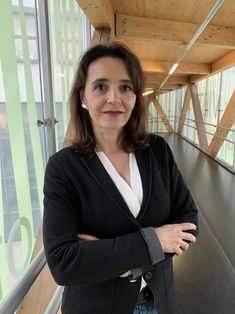Univ.Prof. DI Dr. Christina Schäffer
Starting in 2022, Christina Schäffer is full Professor for “Molecular Glycobiology” at the Institute of Biochemistry, Department of Chemistry of the BOKU University (Universität für Bodenkultur Wien, BOKU Vienna).
Christina Schäffer was born in Tulln, Austria. She obtained a Master’s degree in Biotechnology (Dipl.-Ing.) in 1991 from BOKU Wien under the supervision of Prof. Leopold März (Department of Chemistry) and a PhD degree in 1995 from BOKU Wien (Dr.nat.techn.) under the supervision of Prof. Paul Messner (Center for Ultrastructure Research). During her PhD, she spent a research stay at the Department of Microbiology of the University of Ulm, Germany. In 1995, she was promoted to the rank of university assistant. After carrying out postdoctoral work with Prof. Chris Whitfield at the Department of Microbiology, University of Guelph, Canada, in 1999, she returned to the Department of Nanobiotechnology (previously, Center of Ultrastructure Research) at BOKU Wien, where she obtained the venia docendi for “Microbiology” and was promoted to the rank of Ao.Univ.Prof. in 2003.
Christina Schäffer is recipient of the „Kulturpreis des Landes Niederösterreich“ (1996), the „Prof. Anton-Kurier Preis zur Förderung wissenschaftlicher Nachwuchskräfte“ (2004), the „Würdigungspreis des Landes Niederösterreich für Angewandte Forschung“ (2006), the „Austrian Microbiology Award“ (2008) and the „Young Investigator Award from the Federation of American Societies for Experimental Biology” (2008).
She is member of the Society for Glycobiology, the Austrian Association for Molecular Life Sciences and Biotechnology, the American Society for Biochemistry and Molecular Biology, and the Austrian Society for Microbiology, Hygiene and Preventive Medicine, for which she is member of the board of directors. She was Austrian representative of the COST action CM1102 “Multivalent Glycosystems for Nanoscience” (2011-2015). She is member of the Scientific Advisory Board GoVV at the London School of Hygiene and Tropical Medicine, UK, and reviewer for more than 15 funding agencies, including European Commission, NSERC, National Science Center Poland, BBSRC, Science Foundation Israel, and Swiss National Science Foundation. She has peer reviewing activities for more than 25 SCI journals, including Nature Communications, PLoS Pathogens, mBIO, Journal of Biological Chemistry, Glycobiology, Frontiers in Microbiology and Molecular Oral Microbiology.
Christina Schäffer’s research has been focused on bacterial self-assembling cell surface (S-) layer proteins serving as model systems to study bacterial glycosylation including the ultrastructural characterization of the bacterial cell wall by transmission electron microscopy. Among her early achievements are the first complete description of a bacterial S-layer glycosylation pathway based on targeted gene deletion, the production of the first recombinant S-layer glycoprotein by heterologous glycosylation engineering in bacteria, and the exploitation of the S-layer self-assembly system for in vivo cell surface display of tailor-made glycans. She was involved in the discovery of secondary cell wall glycopolymers as anchors for S-layer proteins at the bacterial cell surface, elucidated glycopolymer biosynthesis by in vitro pathway reconstruction and currently successfully investigates the molecular logic of S-layer anchoring in Paenibacillus alvei, as a model for Bacillus anthracis. S-layer research was a driver for studies of the oral biofilm pathogen Tannerella forsythia, for which Christina Schäffer could demonstrate S-layer glycosylation in the first Gram-negative bacterium, including characterization of a novel mode of S-layer assembly. Together with her team she unraveled how glycosylation orchestrates the pathogenicity of T. forsythia and affects the multispecies oral biofilm, demonstrating, for the first time, the relevance of bacterial glycobiology in the oral biofilm disease periodontitis. Recent work of Christina Schäffer focuses on the communication within oral microbial communities enabled by secondary metabolites and their role at the host immune interface.
Further information can be found at:
“ORCID https://orcid.org/0000-0003-1613-7258

